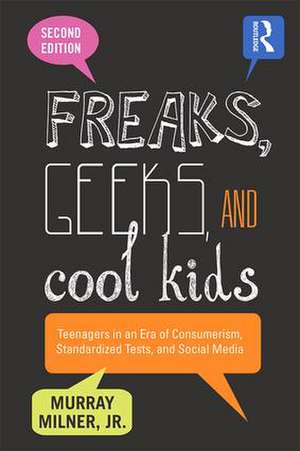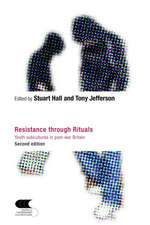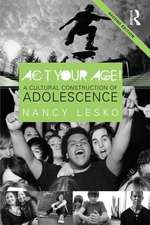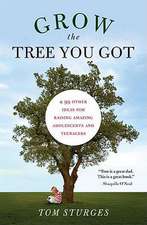Freaks, Geeks, and Cool Kids: Teenagers in an Era of Consumerism, Standardized Tests, and Social Media
Autor Murray Milneren Limba Engleză Paperback – sep 2015
| Toate formatele și edițiile | Preț | Express |
|---|---|---|
| Paperback (1) | 452.35 lei 6-8 săpt. | |
| Taylor & Francis – sep 2015 | 452.35 lei 6-8 săpt. | |
| Hardback (1) | 1607.04 lei 6-8 săpt. | |
| Taylor & Francis – 9 sep 2015 | 1607.04 lei 6-8 săpt. |
Preț: 452.35 lei
Nou
Puncte Express: 679
Preț estimativ în valută:
86.58€ • 94.08$ • 72.78£
86.58€ • 94.08$ • 72.78£
Carte tipărită la comandă
Livrare economică 21 aprilie-05 mai
Preluare comenzi: 021 569.72.76
Specificații
ISBN-13: 9781138013445
ISBN-10: 1138013447
Pagini: 380
Dimensiuni: 152 x 229 x 20 mm
Greutate: 0.52 kg
Ediția:Revised
Editura: Taylor & Francis
Colecția Routledge
Locul publicării:Oxford, United Kingdom
ISBN-10: 1138013447
Pagini: 380
Dimensiuni: 152 x 229 x 20 mm
Greutate: 0.52 kg
Ediția:Revised
Editura: Taylor & Francis
Colecția Routledge
Locul publicării:Oxford, United Kingdom
Public țintă
UndergraduateCuprins
Part I. The Puzzle and the Tools 1. Why Do They Behave Like That? 2. The Tools for Understanding Part II. Explaining Teens’ Behavior 3. Fitting In, Standing Out, and Keeping Up 4. Steering Clear, Hanging Out, and Hooking Up 5. Exchanges, Labels, and Put-Downs Part III. Why Schools Vary 6. The Pluralistic High School 7. Other Kinds of Schools Part IV. Teen Status Systems and Consumerism 8. Creating Consumers 9. Consuming Life 10. Conclusions and Implications Part V: Fifteen Years Later 11. Fifteen Years Later Appendix I. The Theory of Status Relations: Elaborations Appendix II. Data and Methods Appendix III. Sample Research Materials Appendix IV. Data and Method 2013-14
Notă biografică
Murray Milner, Jr. is Emeritus Professor of Sociology and Senior Fellow at the Institute for Advanced Studies in Culture, University of Virginia. His book Status and Sacredness received the American Sociological Society’s Distinguished Book Award. His most recent book is Elites: A General Model (Polity Books 2015).
Recenzii
Written about 15 years after the publication of the first edition (CH, Nov'04, 42-1642), Milner’s updated book argues that teenagers’ peer relations and status systems continue to dominate their consciousness. Though most chapters remain the same with some editorial changes, chapter 1 includes an updated analysis of why teenagers behave the way they do, especially in the contemporary digital society. Milner (emer., sociology, Virginia) also adds a new chapter at the end confirming that despite the social changes over the last 15 years, little has changed in that status systems still matter and drive teenage behaviors. But he also recognizes that status does not depend only on associations and conformity, as conventional theories on socialization and individuation claim. Rather, status is also contingent on visibility. This is why “Facebook official,” “fear of missing out,” and other new social phenomena have appeared in the lives of teenagers. Milner argues that “keeping up” is about knowing what others wrote on social media and not about fashion. The book’s new observation research, contrasted with that from the early 2000s, serves as a testament to what has and has not changed in 15 years. --Y. Kiuchi, Michigan State University, in CHOICE
Descriere
In Freaks, Geeks, and Cool Kids: Teenagers in an Era of Consumerism, Standardized Tests, and Social Media, Second Edition, award-winning sociologist Murray Milner tries to understand why teenagers behave the way they do. The first edition drew upon two years of intensive fieldwork in one high school and 300 written interviews about high schools across the country, where he argued that consumer culture greatly impacts the way our youth relate to one another and understand themselves and society. Milner now expands on that concept with a new year of fieldwork fifteen years after he began. He has uncovered in teens a move away from consumerism and towards the cultural capital of information in a time of social media and standardized tests.





















